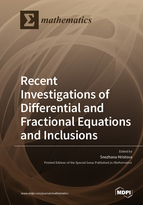Recent Investigations of Differential and Fractional Equations and Inclusions
A special issue of Mathematics (ISSN 2227-7390). This special issue belongs to the section "Difference and Differential Equations".
Deadline for manuscript submissions: closed (31 October 2020) | Viewed by 20600
Special Issue Editor
Interests: differential equations; delays; impulses; difference equations; fractional differential equations
Special Issues, Collections and Topics in MDPI journals
Special Issue Information
Dear Colleagues,
During the past decades the subject of the calculus of integrals and derivatives of any arbitrary real or complex order has gained considerable popularity and importance. This is mainly due to its demonstrated applications in numerous seemingly diverse and widespread fields of science and engineering.
This Special Issue invites papers that focus on recent and novel developments in the theory of any types of differential and fractional differential equations and inclusions, especially on analytical and numerical results for fractional ordinary and partial differential equations.
This Special Issue will accept high-quality papers containing original research results and survey articles of exceptional merit in the following fields:
- Differential equations and inclusions;
- Differential equations and inclusions with impulses;
- Delay differential equations;
- Fuzzy differential and integral equations;
- Fractional differential equations and inclusions;
- Difference equations;
- Discrete fractional equations;
- Dynamical models with differential, fractional, difference, or fuzzy equations.
Prof. Dr. Snezhana Hristova
Guest Editor
Manuscript Submission Information
Manuscripts should be submitted online at www.mdpi.com by registering and logging in to this website. Once you are registered, click here to go to the submission form. Manuscripts can be submitted until the deadline. All submissions that pass pre-check are peer-reviewed. Accepted papers will be published continuously in the journal (as soon as accepted) and will be listed together on the special issue website. Research articles, review articles as well as short communications are invited. For planned papers, a title and short abstract (about 100 words) can be sent to the Editorial Office for announcement on this website.
Submitted manuscripts should not have been published previously, nor be under consideration for publication elsewhere (except conference proceedings papers). All manuscripts are thoroughly refereed through a single-blind peer-review process. A guide for authors and other relevant information for submission of manuscripts is available on the Instructions for Authors page. Mathematics is an international peer-reviewed open access semimonthly journal published by MDPI.
Please visit the Instructions for Authors page before submitting a manuscript. The Article Processing Charge (APC) for publication in this open access journal is 2600 CHF (Swiss Francs). Submitted papers should be well formatted and use good English. Authors may use MDPI's English editing service prior to publication or during author revisions.
Keywords
- differential equations
- differential inclusions
- fuzzy differential and integral equations
- fractional differential equations
- difference equations
- dynamical models






